Pope Francis gave another interview, this time with Eugenio Scalfari of La Repubblica. The English version of the interview is titled, “How the Church will change.”
You’ll remember Scalfari of a few weeks ago who who was in dialogue with Francis.
Pope Francis gave another interview, this time with Eugenio Scalfari of La Repubblica. The English version of the interview is titled, “How the Church will change.”
You’ll remember Scalfari of a few weeks ago who who was in dialogue with Francis.
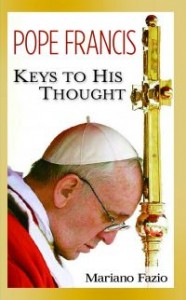 Many of thee books I read or glanced at over the recent six months have not been too helpful in understanding the newly elected Pope, Francis. A recent publication, Pope Francis: Key to His Thought, has promise. Penned by Monsignor Mariano Fazio, Vicar of the Prelature of Opus Dei in Argentina since 2010, begins the substance of his narrative when he first met Jorge Mario Cardinal Bergoglio in Rome in 2000. Fazio was then working at the Pontifical University of the Holy Cross; he was rector there from 2002-2008.
Many of thee books I read or glanced at over the recent six months have not been too helpful in understanding the newly elected Pope, Francis. A recent publication, Pope Francis: Key to His Thought, has promise. Penned by Monsignor Mariano Fazio, Vicar of the Prelature of Opus Dei in Argentina since 2010, begins the substance of his narrative when he first met Jorge Mario Cardinal Bergoglio in Rome in 2000. Fazio was then working at the Pontifical University of the Holy Cross; he was rector there from 2002-2008.
The author’s thesis is based on many friendly meetings with Francis and thus sketches in a lively manner some of the key ideas that are fundamental in knowing who the Pope is as a person and as a shepherd. I think this perspective opens wider the door of our opinion of the new pope and hopefully engenders in us a spirit of greater collaboration based on something concrete versus the media hype that is prevalent these days.
Monsignor Fazio’s text covers Francis’ “urgency to defend human life and marriage, and the need to ‘go out to the periphery’ to meet people where they are. The latter concern is reflected in the strong encouragement given by Cardinal Bergoglio to the so-called “shantytown priests” for the envangelization of the poorest neighborhoods in Buenos Aires. This effort was grounded on sacramental catechesis and educational projects that foster human dignity, and was never to be confused, Bergoglio always insisted, with an overly political ‘liberation theology.'”
As Fazio says, “I have three letters he sent me in recent years. Whenever I sent him anything, he would respond in writing, in his own hand. The format was always the same: a large card with an image of La Virgen Desatanudos (Our Lady Undoer of Knots), a title originating in Augsburg, Germany (Maria Knotenlöserin) that he had made known in Buenos Aires . . . In the blank space he writes in small letters, much like Benedict XVI, a few personal and affectionate lines. Here are some: ‘I wish you a holy and happy Christmas. May Jesus bless you and our Lady take care of you. And, please, I ask that you pray and have others pray for me’ . . . These notecards were always accompanied by two holy pictures: one of St. Joseph and the other of St. Therese of the Child Jesus, saints to whom he had great devotion . . . On the back of the picture of St. Joseph is the famous text of St. Teresa of Jesus about the efficacy of devotion to the Holy Patriarch. On various occasions when, having spoken with him, I asked for his blessing, he always invoked these saints and in addition placed me under the protection of St. Josemaria.”
Pope Francis: Keys to His Thought is available from Scepter Publishers.
On a yearly basis the Pope meets with the full assembly of the various departments at the Holy See that assist him in his ministry. This past Saturday (21 September 2013) Pope Francis spoke to the participants of the Plenary Assembly of the Pontifical Council for Social Communications. This Council’s head is Archbishop Claudio Maria Celli, 72, and the Secretary is Monsignor Paul Tighe, 55, a priest of the archdiocese of Dublin. There are several cardinals, bishops, priests, religious and laity who serve as a advisors to the Council.
I’ve been noticing nowadays how often Francis uses the words “discernment,” “journey,” “dialogue,” “understanding,” “encounter” –words that contribute to the building of relationships in Jesus Christ. For me, the notion of relationships is key: it is more than mere social networking, or having a familiarity with technology, or a keeping a Facebook community entertained. Being in relationship means being with another in the Christian sense is caring for the destiny of the other, of sharing life, being human, of telling the other the reasons for our hope, having the capacity to be concretely present to another person who may be difficult. Being relational is not the same as engineering a meeting; it is the fundamental posture of openness to someone greater, an openness to everyone.
The controlling ideas of the Pope are thus: meeting Christ today, really, and faithfully, so that we make a journey of faith by building the Kingdom and confessing Jesus as Savior, without fracture, sans fantasy. The concern of Pope Francis ought to be our concern, too: do we communicate that the Church is a home to all people, or a museum of plastic saints???
The address, like the Pope’s recent interview, needs to be read in continuity with the tradition of the Church and in dialogue with each other. Hence, the the following is not meant only for the advisors and other interested parties, but for all the baptized: cleric, religious and lay person. No exception.
Here’s the Pope address with emphasis added.
Dear Brothers and Sisters, good morning!
I greet you and I thank you for your work and commitment to the important sector of social communications – but having spoken to Archbishop Celli, I must change “sector” to the important “dimension of life” which is that of social communications. I wish to thank Archbishop Claudio Maria Celli for the greeting that he extended to me on your behalf. I would like to share some thoughts with you.
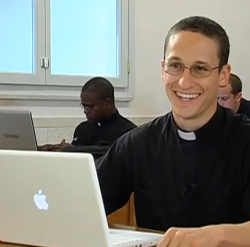 First of all: the importance of social communications for the Church. This year is the fiftieth anniversary of the Conciliar Decree Inter Mirifica. This anniversary is more than a commemoration; the Decree expresses the Church’s attentiveness towards communication and all its instruments, which are also important in the work of evangelisation. But towards its instruments – communication is not an instrument! It’s something else. In the last few decades, the various means of communication have evolved significantly, but the Church’s concern remains the same, taking on new forms and expressions. The world of social communications, more and more, has become a “living environment” for many, a web where people communicate with each other, expanding the boundaries of their knowledge and relationships (cf. Benedict XVI, Message for the 2013 World Communications Day). I wish to underline these positive aspects, although we are all aware of the limitations and harmful factors which also exist.
First of all: the importance of social communications for the Church. This year is the fiftieth anniversary of the Conciliar Decree Inter Mirifica. This anniversary is more than a commemoration; the Decree expresses the Church’s attentiveness towards communication and all its instruments, which are also important in the work of evangelisation. But towards its instruments – communication is not an instrument! It’s something else. In the last few decades, the various means of communication have evolved significantly, but the Church’s concern remains the same, taking on new forms and expressions. The world of social communications, more and more, has become a “living environment” for many, a web where people communicate with each other, expanding the boundaries of their knowledge and relationships (cf. Benedict XVI, Message for the 2013 World Communications Day). I wish to underline these positive aspects, although we are all aware of the limitations and harmful factors which also exist.
In this context – and this is the second reflection – we must ask ourselves: what role should the Church have in terms of its own practical means of communication? In every situation, beyond technological considerations, I believe that the goal is to understand how to enter into dialogue with the men and women of today, in order to appreciate their desires, their doubts, and their hopes. They are men and women who sometimes feel let down by a Christianity that to them appears sterile, struggling precisely to communicate the depth of meaning that faith gives. We do in fact witness today, in the age of globalisation, a growing sense of disorientation and isolation; we see, increasingly, a loss of meaning to life, an inability to connect with a “home”, and a struggle to build meaningful relationships. It is therefore important to know how to dialogue, and how to enter, with discernment, into the environments created by new technologies, into social networks, in such a way as to reveal a presence that listens, converses, and encourages. Do not be afraid to be this presence, expressing your Christian identity as you become citizens of this environment. A Church that follows this path learns how to walk with everybody! And there’s also an ancient rule of the pilgrims, that Saint Ignatius includes, and that’s why I know it! In one of his rules, he says that anyone accompanying a pilgrim must walk at the same pace as the pilgrim, not ahead and not lagging behind. And this is what I mean: a Church that accompanies the journey, that knows how to walk as people walk today. This rule of the pilgrim will help us to inspire things.
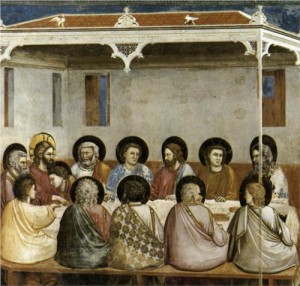 The third: it’s a challenge that we all face together in this environment of social communications, and the problem is not principally technological. We must ask ourselves: are we capable of bringing Christ into this area, or rather, of bringing about the encounter with Christ? To walk with the pilgrim through life, but as Jesus walked with the pilgrims of Emmaus, warming their hearts and leading them to the Lord? Are we capable of communicating the face of a Church which can be a “home” to everyone? We talk about the Church behind closed doors. But this is more than a Church with open doors, it’s more! Finding “home” together, building “home”, building the Church. It’s this: building the Church as we walk. A challenge! To lead to the rediscovery, through means of social communication as well as by personal contact, of the beauty which is at the heart of our existence and our journey, the beauty of faith, the beauty of the encounter with Christ. Even in the context of social communications, the Church is required to bring warmth, to warm hearts. Does our presence and plans measure up to this requirement, or do we remain mired in technicalities? We hold a precious treasure that is to be passed on, a treasure that brings light and hope. They are greatly needed. All this, however, requires a careful and thorough formation in this area for priests, for religious men and women, for laity. The great digital continent does not only involve technology, but is made up of real men and women who bring with them what they carry inside, their hopes, their suffering, their concerns, their pursuit of truth, beauty, and good. We need to show and bring Christ to others, sharing these joys and hopes, like Mary, who brought Christ to the hearts of men and women; we need to pass through the clouds of indifference without losing our way; we need to descend into the darkest night without being overcome and disorientated; we need to listen to the illusions of many, without being seduced; we need to share their disappointments, without becoming despondent; to sympathise with those whose lives are falling apart, without losing our own strength and identity (cf. Pope Francis, Address to the Bishops of Brazil, 27 July 2013, n. 4). This is the walk. This is the challenge.
The third: it’s a challenge that we all face together in this environment of social communications, and the problem is not principally technological. We must ask ourselves: are we capable of bringing Christ into this area, or rather, of bringing about the encounter with Christ? To walk with the pilgrim through life, but as Jesus walked with the pilgrims of Emmaus, warming their hearts and leading them to the Lord? Are we capable of communicating the face of a Church which can be a “home” to everyone? We talk about the Church behind closed doors. But this is more than a Church with open doors, it’s more! Finding “home” together, building “home”, building the Church. It’s this: building the Church as we walk. A challenge! To lead to the rediscovery, through means of social communication as well as by personal contact, of the beauty which is at the heart of our existence and our journey, the beauty of faith, the beauty of the encounter with Christ. Even in the context of social communications, the Church is required to bring warmth, to warm hearts. Does our presence and plans measure up to this requirement, or do we remain mired in technicalities? We hold a precious treasure that is to be passed on, a treasure that brings light and hope. They are greatly needed. All this, however, requires a careful and thorough formation in this area for priests, for religious men and women, for laity. The great digital continent does not only involve technology, but is made up of real men and women who bring with them what they carry inside, their hopes, their suffering, their concerns, their pursuit of truth, beauty, and good. We need to show and bring Christ to others, sharing these joys and hopes, like Mary, who brought Christ to the hearts of men and women; we need to pass through the clouds of indifference without losing our way; we need to descend into the darkest night without being overcome and disorientated; we need to listen to the illusions of many, without being seduced; we need to share their disappointments, without becoming despondent; to sympathise with those whose lives are falling apart, without losing our own strength and identity (cf. Pope Francis, Address to the Bishops of Brazil, 27 July 2013, n. 4). This is the walk. This is the challenge.
Dear friends, the concern and the presence of the Church in the world of social communications is important in order to dialogue with the men and women of today and bring them to meet Christ, but the encounter with Christ is personal. It cannot be manipulated. In these times we see a great temptation within the Church, which is spiritual harassment: the manipulation of conscience; a theological brainwashing which in the end leads to an encounter with Christ which is purely nominal, not with the Live Person of Christ. In a person’s encounter with Christ, both Christ and the person need to be involved! Not what’s wanted by the “spiritual engineer”, who wants to manipulate people. This is the challenge. To bring about the encounter with Christ in the full knowledge, though, that we ourselves are means of communication, and that the fundamental problem is not the acquisition of the latest technologies, although these are necessary to a valid, contemporary presence. It is necessary to be absolutely clear that the God in whom we believe, who loves all men and women intensely, wants to reveal himself through the means at our disposal, however poor they are, because it is he who is at work, he who transforms, and he who saves us.
Let us all pray that the Lord may warm our hearts and sustain us in the engaging mission of bringing him to the world. I ask you for your prayers, because this is my mission too, and I assure you of my blessing.
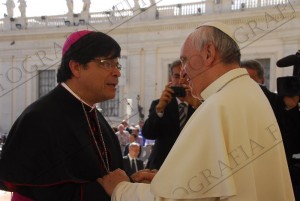 Remember the three words the Pope had for us in the first Mass he offered following his election? They’re easy to remember: to walk, to build, to confess. You can change them slightly, but you ought to recall them frequently. Pope Francis does and he reminds the Church –even baby bishops– of these words because they are essential in serving God and His Church. The following are a few paragraphs of an address the Pope gave (19 September 2013) when the greeted the group of new bishops at the conclusion of their meeting in Rome this week. He notes many essential things: humility, austerity, unity, communion, paternity, concrete witness, spousal relationship, etc. This is an amazing text to ponder, to live with vigor. Don’t this be a dead letter! Ecclesiology will never be the same.
Remember the three words the Pope had for us in the first Mass he offered following his election? They’re easy to remember: to walk, to build, to confess. You can change them slightly, but you ought to recall them frequently. Pope Francis does and he reminds the Church –even baby bishops– of these words because they are essential in serving God and His Church. The following are a few paragraphs of an address the Pope gave (19 September 2013) when the greeted the group of new bishops at the conclusion of their meeting in Rome this week. He notes many essential things: humility, austerity, unity, communion, paternity, concrete witness, spousal relationship, etc. This is an amazing text to ponder, to live with vigor. Don’t this be a dead letter! Ecclesiology will never be the same.
Francis said in part (the full text is here):
To welcome with magnanimity. May your heart be so large that you are able to welcome all men and women that you meet in the course of your days and that you will go to seek when you begin your journey in your parishes and in every community. Henceforth ask yourselves: how will those who knock on the door of my house find it? If they find it open, through your kindness, your availability, they will experience God’s paternity and they will understand that the Church is a good Mother that always welcomes and loves.
To walk with the flock. Welcome all to walk with all. The Bishop is journeying with his flock. This means to go on the way with your faithful and with all those who turn to you, sharing their joys and hopes, difficulties and sufferings, as brothers and friends, but even more as fathers, who are able to listen, to understand, to help, to guide. To walk together calls for love and ours is a service of love, amoris officium, said Saint Augustine (In Io. Ev. Tract.123,5: PL35, 1967).
And in journeying I would like to mention affection for your priests. They are the first neighbors of a Bishop, indispensable collaborators to whom we look for counsel and help, to take care of as fathers, brothers and friends. Among the first tasks you have is the spiritual care of the presbyter, but do not forget the human need of each priest, above all in the more delicate and important moments of his ministry and life. Time spent with priests is never lost time! Receive them when they request it; do not fail to answer a telephone call; be constantly close, in continuous contact with them.
Then presence in the diocese. In the homily of the Chrism Mass of this year, I said that Pastors must have “the scent of sheep.” Be Pastors with the scent of sheep, present in the midst of your people as Jesus the Good Shepherd. Your presence is not secondary, it’s indispensable. The people themselves ask for it; they want to see their Bishop walk with them, being close to them. They need it to live and to breathe! Don’t close yourselves! Descend in the midst of your faithful, also in the fringes of your dioceses and in all those “existential fringes” where there is suffering, loneliness, human degradation. Pastoral presence means to journey with the People of God: in front, pointing out the way; in their midst, einforcing them in unity; behind, so that no one will remain behind but, above all, to follow the scent that the People of God have to find new ways. A Bishop who lives in the midst of his faithful has his ears open to hear “what the Spirit says to the Churches” (Revelation 2:7) and the “voice of the sheep,” also through those diocesan organizations that have the task of advising the Bishop, promoting a loyal and constructive dialogue. This pastoral presence will also enable you to know in depth the culture, the usages, the customs of the territory, the richness of sanctity that is present there. To be immersed in one’s flock.
Fo me, these words are some of central points of our teaching: “the Bishop is a man of communion and unity, the ‘visible principle and foundation of unity’ (Lumen gentium, 27).”
Is the Associated Press confused now? I’m not. Neither should you be.
Earlier today this post showed up on the AP. No doubt some are confused, others awkwardly changing their underwear after yesterday’s media frenzy about the Pope changing directions.
In an address to a group of Catholic gynecologists gathered by the International Federation of Catholic Medical Associations, Pope Francis said in part,
The cultural disorientation has affected an ambit that seemed unassailable: yours, medicine! Although being by their nature at the service of life, the health professions are induced sometimes not to respect life itself. Instead, as the encyclical Caritas in veritate reminds us, “openness to life is at the center of true development. […] If personal and social sensibility is lost to welcoming a new life, other forms of reception useful to social life are hardened. The reception of life tempers moral energies and makes possible mutual help” (n. 28). The paradoxical situation is seen in the fact that, while new rights are attributed to the person, sometimes even presumed, life is not always protected as primary value and primordial right of every man. The ultimate end of medical action always remains the defense and promotion of life.
The full text is here.
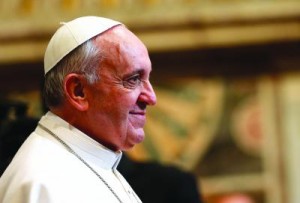 Earlier the world was given the text of an exclusive interview by Pope Francis. The interview was conducted by Jesuit Father Antonio Spadaro, editor in chief of La Civiltà Cattolica.
Earlier the world was given the text of an exclusive interview by Pope Francis. The interview was conducted by Jesuit Father Antonio Spadaro, editor in chief of La Civiltà Cattolica.
America magazine is one several Jesuit publications honored with the task of getting the word out.
Here is “A Big Heart Open to God.”
Hopefully we’ll read the interview first, let it sink in, and refrain from spin, in any direction. Pope Francis, like his predecessor, is a nuanced thinker.
As you know Pope Francis wrote a letter to an Italian journalist, Eugenio Scalfari, who claims to be an atheist; the letter was printed in the Italian daily, La Repubblica. To make a generalization, this newspaper is a left-leaning publication. This letter is now widely read by people across the globe because even the rabid anti-Christian people are interested in Pope Francis these days. AND this is a good thing. The money quote for me from the Pope’s letter to Doctor Scalfari is when the Pope said, “For me, faith began by meeting with Jesus.” The Pope does what we serious Christians ought to be doing, that is, engaging the non-believer, helping the believer who is wavering in faith and doing the hard word ourselves. There is no new doctrine here, there is no new advantage gained in printing this letter; there is, however, great charity and fraternal concern. There is no such thing as a part time Christian. We good witnesses more than teachers in the faith. Will the witnesses present themselves?
BTW, you may want to refresh your memory with Lumen gentium, 16.
The Pope’s letter follows.
Dear Doctor Scalfari,
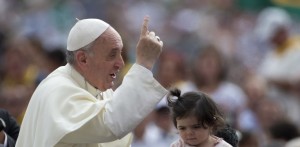 I would cordially like to reply to the letter you addressed to me from the pages of La Repubblica on July 7th, which included a series of personal reflections that then continued to enrich the pages of the daily newspaper on August 7th.
I would cordially like to reply to the letter you addressed to me from the pages of La Repubblica on July 7th, which included a series of personal reflections that then continued to enrich the pages of the daily newspaper on August 7th.
First of all, thank you for the attention with which you have read the Encyclical Lumen fidei.” In fact it was the intention of my beloved predecessor, Benedict XVI, who conceived it and mostly wrote it, and which, with gratitude, I have inherited, to not only confirm the faith in Jesus Christ, for those who already believe, but also to spark a sincere and rigorous dialogue with those who, like you, define themselves as “for many years being a non-believer who is interested and fascinated by the preaching of Jesus of Nazareth.”
Therefore, without a doubt it would seem to be positive, not only for each one of us, but also for the society in which we live, to stop and speak about a matter as important as faith and which refers to the teachings and the figure of Jesus.
In particular, I think there are two circumstances which today cause this dialogue to be precious and necessary. This is one of the principal aims of the Second Vatican Council, convened at the behest of John XXIII as well as by the Apostolic Ministry of the Popes who, each with their own sensibility and help have since then continued in the course traced by the Council.
The first circumstance -that refers to the initial pages of the Encyclical- derives from the fact that, down in the centuries of modern life, we have seen a paradox: Christian faith, whose novelty and importance in the life of mankind since the beginning has been expressed through the symbol of light, has often been branded as the darkness of superstition which is opposed to the light of reason. Therefore a lack of communication has arisen between the Church and the culture inspired by Christianity on one hand and the modern culture of Enlightenment on the other. The time has come and the Second Vatican has inaugurated the season, for an open dialogue without preconceptions that opens the door to a serious and fruitful meeting.
The second circumstance, for those who attempt to be faithful to the gift of following Jesus in the light of faith, derives from the fact that this dialogue is not a secondary accessory in the existence of those who believe, but is rather an intimate and indispensable expression. Speaking of which, allow me to quote a very important statement, in my opinion, of the Encyclical: as the truth witnessed by faith is found in love -it is stressed- “it seems clear that faith is not unyielding, but increases in the coexistence which respects the other. The believer is not arrogant; on the contrary, the truth makes him humble, in the knowledge that rather than making us rigid, it embraces us and possesses us. Rather than make us rigid, the security of faith makes it possible to speak with everyone” (n.34). This is the spirit of the words I am writing to you.
For me, faith began by meeting with Jesus. A personal meeting that touched my heart and gave a direction and a new meaning to my existence. At the same time, however, a meeting that was made possible by the community of faith in which I lived and thanks to which I found access to the intelligence of the Sacred Scriptures, to the new life that comes from Jesus like gushing water through the Sacraments, to fraternity with everyone and to the service to the poor, which is the real image of the Lord. Believe me, without the Church I would never have been able to meet Jesus, in spite of the knowledge that the immense gift of faith is kept in the fragile clay vases of our humanity.
Now, thanks to this personal experience of faith experienced in Church, I feel comfortable in listening to your questions and together with you, will try to find a way to perhaps walk along a path together.
Please forgive me if I do not follow the arguments proposed by you step by step in your editorial of July 7th. It would seem more fruitful to me -or more congenial- to go right to the heart of your considerations. I will not even go into the manners of explanation followed by the Encyclical, in which you find the lack of a section specifically dedicated to the historical experience of Jesus of Nazareth.
To start, I will only observe that such an analysis is not secondary. In fact, following the logic of the Encyclical, this means paying attention to the meaning of what Jesus said and did and after all, of what Jesus has been and is for us. The Letters of Paul and the Gospel according to John, to which particular reference is made in the Encyclical, are in fact created on the solid foundation of the Messianic Ministry of Jesus of Nazareth which culminated in the pentecost of death and resurrection.
Therefore, I would say that we must face Jesus in the concrete roughness of his story, as above all told to us by the most ancient of the Gospels, the one according to Mark. We then find that the “scandal” which the word and practices of Jesus provoke around him derive from his extraordinary “authority”: a word that has been certified since the Gospel according to Mark, but that is not easy to translate well into Italian. The Greek word is “exousia,” which literally means “comes from being” what one is. It is not something exterior or forced, but rather something that emanates from the inside and imposes itself. Actually Jesus, amazes and innovates starting from, he himself says this, his relationship with God, called familiarly Abbà, who gives him this “authority” so that he uses it in favor of men.
So Jesus preaches “like someone who has authority,” he heals, calls his disciples to follow him, forgives… things that, in the Old Testament, belong to God and only God. The question that most frequently is repeated in the Gospel according to Mark: “Who is he who…?”, and which regards the identity of Jesus, arises from the recognition of an authority that differs from that of the world, an authority that aims not at exercising power over others, but rather serving them, giving them freedom and the fullness of life. And this is done to the point of staking his own life, up to experiencing misunderstanding, betrayal, refusal, until he is condemned to die, left abandoned on the cross. But Jesus remained faithful to God, up to his death.
And it is then -as the Roman centurion exclaims, in the Gospel according to Mark- that Jesus is paradoxically revealed as the Son of God. Son of a God that is love and that wants, with all of himself that man, every man, discovers himself and also lives like his real son. For Christian faith this is certified by the fact that Jesus rose from the dead: not to be triumphant over those who refused him, but to certify that the love of God is stronger than death, the forgiveness of God is stronger than any sin and that it is worthwhile to give one’s life, to the end, to witness this great gift.
Christian faith believes in this: that Jesus is the Son of God who came to give his life to open the way to love for everyone. Therefore there is a reason, dear Dr. Scalfari, when you see the incarnation of the Son of God as the pivot of Christian faith. Tertullian wrote “caro cardo salutis,” the flesh (of Christ) is the pivot of salvation. Because the incarnation, that is the fact that the Son of God has come into our flesh and has shared joy and pain, victories and defeat of our existence, up to the cry of the cross, living each event with love and in the faith of Abbà, shows the incredible love that God has for every man, the priceless value that he acknowledges. For this reason, each of us is called to accept the view and the choice of love made by Jesus, become a part of his way of being, thinking and acting. This is faith, with all the expressions that have been dutifully described in the Encyclical [Lumen fidei].
* * *
In your editorial of July 7th, you also asked me how to understand the originality of Christian Faith as it is actually based on the incarnation of the Son of God, with respect to other religions that instead pivot on the absolute transcendency of God.
I would say that the originality lies in the fact that faith allows us to participate, in Jesus, in the relationship that He has with God who is Abbà and, because of this, in the relationship that He has with all other men, including enemies, in the sign of love. In other words, the children of Jesus, as Christian faith presents us, are not revealed to mark an insuperable separation between Jesus and all the others: but to tell us that, in Him, we are all called to be the children of the only Father and brothers with each other. The uniqueness of Jesus is for communication not for exclusion.
Of course a consequence of this is also – and this is not a minor thing- that distinction between the religious sphere which is confirmed by “Give to God what belongs to God and give to Caesar what belongs to Caesar,” distinctly confirmed by Jesus and upon which, the history of the Western world was built. In fact, the Church is called to sow the yeast and salt of the Gospel, and that is the love and mercy of God which reaches all men, indicating the definitive destination of our destiny in the hereafter, while civil and political society has the difficult duty of expressing and embodying a life that is evermore human in justice, in solidarity, in law and in peace. For those who experience the Christian faith, this does not mean escaping from the world or looking for any kind of supremacy, but being at the service of mankind, of all mankind and all men, starting from the periphery of history and keeping the sense of hope alive, striving for goodness in spite of everything and always looking beyond.
At the end of your first article, you also ask me what to say to our Jewish brothers about the promise God made to them: Has this been forgotten? And this -believe me- is a question that radically involves us as Christians because, with the help of God, starting from the Second Vatican Council, we have discovered that the Jewish people are still, for us, the holy root from which Jesus originated. I too, in the friendship I have cultivated in all of these long years with our Jewish brothers, in Argentina, many times while praying have asked God, especially when I remember the terrible experience of the Shoah. What I can say, with the Apostle Paul, is that God has never stopped believing in the alliance made with Israel and that, through the terrible trials of these past centuries, the Jews have kept their faith in God. And for this, we will never be grateful enough to them, as the Church, but also as humanity at large. Persevering in their faith in God and in the alliance, they remind everyone, even us as Christians that we are always awaiting, the return of the Lord and that therefore we must remain open to Him and never take refuge in what we have already achieved.
As for the three questions you asked me in the article of August 7th. It would seem to me that in the first two, what you are most interested in is understanding the Church’s attitude towards those who do not share faith in Jesus. First of all, you ask if the God of the Christians forgives those who do not believe and do not seek faith. Given that -and this is fundamental- God’s mercy has no limits if he who asks for mercy does so in contrition and with a sincere heart, the issue for those who do not believe in God is in obeying their own conscience. In fact, listening and obeying it, means deciding about what is perceived to be good or to be evil. The goodness or the wickedness of our behavior depends on this decision.
Second of all, you ask if the thought, according to which no absolute exists and therefore there is no absolute truth, but only a series of relative and subjective truths is a mistake or a sin. To start, I would not speak about, not even for those who believe, an “absolute” truth, in the sense that absolute is something detached, something lacking any relationship. Now, the truth is a relationship! This is so true that each of us sees the truth and expresses it, starting from oneself: from one’s history and culture, from the situation in which one lives, etc. This does not mean that the truth is variable and subjective. It means that it is given to us only as a way and a life. Was it not Jesus himself who said: “I am the way, the truth, the life”? In other words, the truth is one with love, it requires humbleness and the willingness to be sought, listened to and expressed. Therefore we must understand the terms well and perhaps, in order to avoid the over simplification of absolute contraposition, reformulate the question. I think that today this is absolutely necessary in order to have a serene and constructive dialogue which I hoped for from the beginning.
In the last question you ask if, with the disappearance of man on earth, the thoughts able to think about God will also disappear. Of course, the greatness of mankind lies in being able to think about God. That is in being able to experience a conscious and responsible relationship with Him. But the relationship lies between two realities. God – this is my thought and this is my experience, but how many, yesterday and today, share it! – is not an idea, even if very sublime, the result of the thoughts of mankind. God is a reality with a capital “R”. Jesus reveals this to us – and he experiences the relationship with Him – as a Father of infinite goodness and mercy. God therefore does not depend on our thoughts. On the other hand, even when the end of life for man on earth should come – and for Christian faith, in any case the world as we know it now is destined to end, man will not finish existing and, in a way that we do not know, nor will the universe created with him. The Scriptures speak of “new skies and a new land” and confirm that, in the end, at the time and place that it is beyond our knowledge, but which we patiently and desirously await, God will be “everything in everyone.”
Dear Dr. Scalfari, here I end these reflections of mine, prompted by what you wanted to tell and ask me. Please accept this as a tentative and temporary reply, but sincere and hopeful, together with the invitation that I made to walk a part of the path together. Believe me, in spite of its slowness, the infidelity, the mistakes and the sins that may have and may still be committed by those who compose the Church, it has no other sense and aim if not to live and witness Jesus: He has been sent by Abbà “to bring good news to the poor…to proclaim release to the captives and recovery of sight to the blind, to let the oppressed go free, to proclaim the year of the Lord’s favor” (Luke 4: 18-19).
With brotherly love,
Francesco
(Translated from Italian by Sara Cecere)
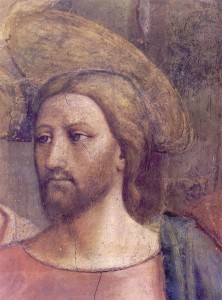 Homily of His Holiness Pope Francis at the Vigil of Prayer and Fasting in Saint Peter’s Square, Saturday 7 September 2013.
Homily of His Holiness Pope Francis at the Vigil of Prayer and Fasting in Saint Peter’s Square, Saturday 7 September 2013.
“And God saw that it was good” (Gen 1:12, 18, 21, 25). The biblical account of the beginning of the history of the world and of humanity speaks to us of a God who looks at creation, in a sense contemplating it, and declares: “It is good”. This allows us to enter into God’s heart and, precisely from within him, to receive his message. We can ask ourselves: what does this message mean? What does it say to me, to you, to all of us?
It says to us simply that this, our world, in the heart and mind of God, is the “house of harmony and peace”, and that it is the space in which everyone is able to find their proper place and feel “at home”, because it is “good”. All of creation forms a harmonious and good unity, but above all humanity, made in the image and likeness of God, is one family, in which relationships are marked by a true fraternity not only in words: the other person is a brother or sister to love, and our relationship with God, who is love, fidelity and goodness, mirrors every human relationship and brings harmony to the whole of creation. God’s world is a world where everyone feels responsible for the other, for the good of the other.
This evening, in reflection, fasting and prayer, each of us deep down should ask ourselves: Is this really the world that I desire? Is this really the world that we all carry in our hearts? Is the world that we want really a world of harmony and peace, in ourselves, in our relations with others, in families, in cities, in and between nations? And does not true freedom mean choosing ways in this world that lead to the good of all and are guided by love?
But then we wonder: Is this the world in which we are living? Creation retains its beauty which fills us with awe and it remains a good work. But there is also “violence, division, disagreement, war”. This occurs when man, the summit of creation, stops contemplating beauty and goodness, and withdraws into his own selfishness. When man thinks only of himself, of his own interests and places himself in the centre, when he permits himself to be captivated by the idols of dominion and power, when he puts himself in God’s place, then all relationships are broken and everything is ruined; then the door opens to violence, indifference, and conflict. This is precisely what the passage in the Book of Genesis seeks to teach us in the story of the Fall: man enters into conflict with himself, he realizes that he is naked and he hides himself because he is afraid (cf. Gen 3: 10), he is afraid of God’s glance; he accuses the woman, she who is flesh of his flesh (cf. v. 12); he breaks harmony with creation, he begins to raise his hand against his brother to kill him. Can we say that from harmony he passes to “disharmony”? No, there is no such thing as “disharmony”; there is either harmony or we fall into chaos, where there is violence, argument, conflict, fear ….
It is exactly in this chaos that God asks man’s conscience: “Where is Abel your brother?” and Cain responds: “I do not know; am I my brother’s keeper?” (Gen 4:9). We too are asked this question, it would be good for us to ask ourselves as well: Am I really my brother’s keeper? Yes, you are your brother’s keeper! To be human means to care for one another! But when harmony is broken, a metamorphosis occurs: the brother who is to be cared for and loved becomes an adversary to fight, to kill. What violence occurs at that moment, how many conflicts, how many wars have marked our history! We need only look at the suffering of so many brothers and sisters. This is not a question of coincidence, but the truth: we bring about the rebirth of Cain in every act of violence and in every war. All of us! And even today we continue this history of conflict between brothers, even today we raise our hands against our brother. Even today, we let ourselves be guided by idols, by selfishness, by our own interests, and this attitude persists. We have perfected our weapons, our conscience has fallen asleep, and we have sharpened our ideas to justify ourselves. As if it were normal, we continue to sow destruction, pain, death! Violence and war lead only to death, they speak of death! Violence and war are the language of death!
At this point I ask myself: Is it possible to change direction? Can we get out of this spiral of sorrow and death? Can we learn once again to walk and live in the ways of peace? Invoking the help of God, under the maternal gaze of the Salus Populi Romani, Queen of Peace, I say: Yes, it is possible for everyone! From every corner of the world tonight, I would like to hear us cry out: Yes, it is possible for everyone! Or even better, I would like for each one of us, from the least to the greatest, including those called to govern nations, to respond: Yes, we want it! My Christian faith urges me to look to the Cross. How I wish that all men and women of good will would look to the Cross if only for a moment! There, we can see God’s reply: violence is not answered with violence, death is not answered with the language of death. In the silence of the Cross, the uproar of weapons ceases and the language of reconciliation, forgiveness, dialogue, and peace is spoken.
This evening, I ask the Lord that we Christians, and our brothers and sisters of other religions, and every man and woman of good will, cry out forcefully: violence and war are never the way to peace! Let everyone be moved to look into the depths of his or her conscience and listen to that word which says: Leave behind the self-interest that hardens your heart, overcome the indifference that makes your heart insensitive towards others, conquer your deadly reasoning, and open yourself to dialogue and reconciliation. Look upon your brother’s sorrow and do not add to it, stay your hand, rebuild the harmony that has been shattered; and all this achieved not by conflict but by encounter!
May the noise of weapons cease! War always marks the failure of peace, it is always a defeat for humanity. Let the words of Pope Paul VI resound again: “No more one against the other, no more, never! … war never again, never again war!” (Address to the United Nations, 1965). “Peace expresses itself only in peace, a peace which is not separate from the demands of justice but which is fostered by personal sacrifice, clemency, mercy and love” (World Day of Peace Message, 1975). Forgiveness, dialogue, reconciliation – these are the words of peace, in beloved Syria, in the Middle East, in all the world! Let us pray for reconciliation and peace, let us work for reconciliation and peace, and let us all become, in every place, men and women of reconciliation and peace! Amen.
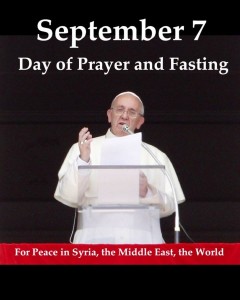 On Sunday, the Pope’s weekly Angelus prayer and address included an invitation to prayer, fasting and awareness for the situation of peace in Syria. On the vigil of the Nativity of Mary, Pope Francis –with all local churches around the world, will meet in supplication. The portion of the Pope’s invitation from the Angelus address is here:
On Sunday, the Pope’s weekly Angelus prayer and address included an invitation to prayer, fasting and awareness for the situation of peace in Syria. On the vigil of the Nativity of Mary, Pope Francis –with all local churches around the world, will meet in supplication. The portion of the Pope’s invitation from the Angelus address is here:
May the plea for peace rise up and touch the heart of everyone so that they may lay down their weapons and let themselves be led by the desire for peace.
To this end, brothers and sisters, I have decided to proclaim for the whole Church on 7 September next, the vigil of the birth of Mary, Queen of Peace, a day of fasting and prayer for peace in Syria, the Middle East, and throughout the world, and I also invite each person, including our fellow Christians, followers of other religions and all men of good will, to participate, in whatever way they can, in this initiative.
On 7 September, in Saint Peter’s Square, here, from 19:00 until 24:00, we will gather in prayer and in a spirit of penance, invoking God’s great gift of peace upon the beloved nation of Syria and upon each situation of conflict and violence around the world. Humanity needs to see these gestures of peace and to hear words of hope and peace! I ask all the local churches, in addition to fasting, that they gather to pray for this intention.
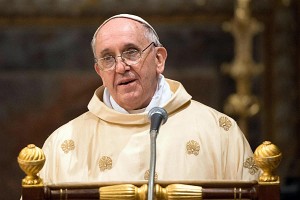 My friend Michael who was present for the papal Mass on the feast of Saint Ignatius on July 31st and posted this recap video. It’s nicely done and it captures a beautiful sensitivity between the the Jesuit bishop of Rome and his brothers who live and work in Rome. A blog post on the papal Mass can be read here.
My friend Michael who was present for the papal Mass on the feast of Saint Ignatius on July 31st and posted this recap video. It’s nicely done and it captures a beautiful sensitivity between the the Jesuit bishop of Rome and his brothers who live and work in Rome. A blog post on the papal Mass can be read here.
I posted His Holiness’ homily here so that you can pray with it.
Saint Ignatius of Loyola pray for the Pope, the Church and all of us.